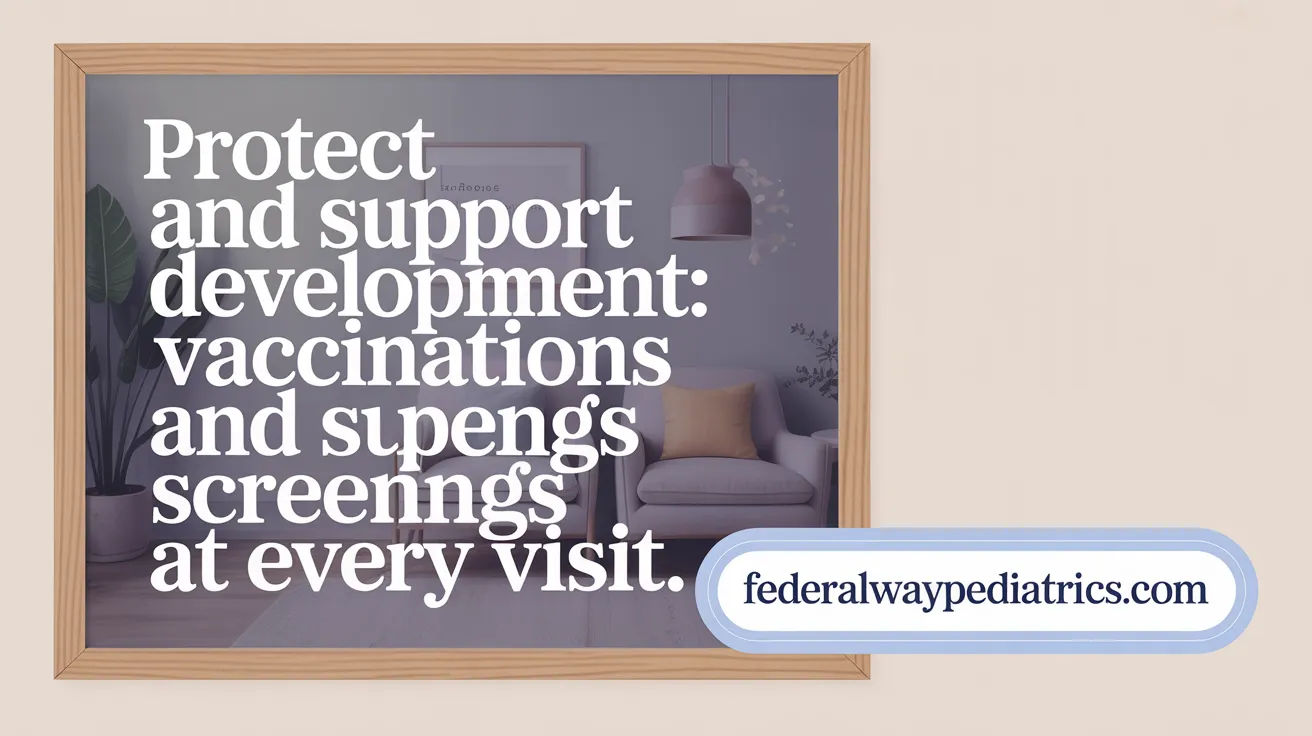Why Well-Child Visits Matter for Your Child's Health
Well-child visits, also known as routine wellness checks, are crucial appointments that support your child's physical, emotional, and developmental health from infancy through adolescence. These visits, guided by expert recommendations from organizations like the American Academy of Pediatrics (AAP), provide a comprehensive approach to preventive healthcare. Establishing a regular schedule ensures timely vaccinations, growth monitoring, and early detection of potential health concerns, helping your child thrive at every stage of development.
Recommended Schedule for Well-Child Visits: From Newborn to Young Adult

What is the recommended schedule for well-child visits?
The American Academy of Pediatrics (AAP) has established a detailed schedule to guide routine health checkups for children and adolescents. The initial visit typically occurs in the newborn period, between 3 to 5 days after birth. After this, there are scheduled visits at 1 month, 2 months, 4 months, 6 months, 9 months, 12 months, 15 months, 18 months, 24 months, and 30 months. These visits focus on monitoring growth, administering vaccines, screening for developmental milestones, and addressing parent questions.
Starting at age 3, children and teenagers should have an annual visit, continuing through age 21. These yearly checkups facilitate ongoing assessments of physical growth, emotional health, behavioral development, and social skills. Vaccinations are scheduled around these visits to protect against preventable diseases, and health screenings such as vision, hearing, and mental health evaluations are regularly conducted.
Adhering to this schedule ensures children stay up-to-date with immunizations, detects developmental delays early, and allows timely interventions for any emerging health concerns. Regular checkups also promote a collaborative approach between health providers and families, supporting overall well-being.
How does visit frequency change by age?
In infancy, visit frequency is higher, with appointments at 3-5 days, 1, 2, 4, 6, 9, and 12 months, due to rapid growth and the need for multiple immunizations.
During early childhood (ages 1-5), annual visits help monitor development, address behavioral health, and ensure vaccination series are completed.
In middle childhood (ages 6-12), yearly visits continue to support growth, school readiness, and behavioral assessments, with additional screening for vision, hearing, and learning issues.
From ages 13 to 18, visits focus more on mental health, sexual health, and risk behaviors, with screenings like depression scales and discussions about social issues.
By late adolescence and early adulthood (ages 19-21), the focus shifts to supporting independence, lifestyle health, and preventive screenings.
Why is it important to follow the recommended schedule?
Following the AAP schedule helps prevent childhood illnesses through timely immunizations, supports proper growth and developmental milestones, and facilitates early detection of health issues.
Skipping well-child visits can lead to missed opportunities for vaccinations, delayed diagnosis of developmental or behavioral concerns, and increased risk of preventable illnesses.
Healthcare providers emphasize the importance of regular visits, especially in early childhood, to build a trusting relationship and provide ongoing support for healthy growth.
Parents are encouraged to confirm appointment schedules with their insurance providers and healthcare clinics, ensuring visits are convenient and comprehensive.
Overall, maintaining adherence to this schedule promotes healthier children and adolescents, ready to thrive in school, sports, and daily life.
Holistic Assessments and Preventive Services During Well-Child Visits
During a well-child visit, healthcare providers perform comprehensive assessments that cover multiple aspects of a child's health and development. The visit begins with a physical exam where the pediatrician checks vital signs, measures height and weight, and evaluates overall physical health. This includes monitoring growth parameters like head circumference and BMI to ensure healthy development.
Developmental milestone assessments are a core part of the visit, involving evaluations of speech, social skills, emotional behavior, and neurodevelopment. Standardized screening tools are often used to identify delays or concerns early on, enabling timely intervention.
Immunizations are administered at scheduled ages to protect children from preventable diseases such as measles, polio, flu, HPV, and meningococcal infections. These vaccines are part of the routine schedule recommended by health authorities like the CDC. Additional screenings, like blood lead levels or hemoglobin tests, may be included based on age, risk factors, and local guidelines.
Vision and hearing screenings are routinely performed to detect impairments that could affect learning and development. For example, vision tests check for acuity issues, while hearing tests identify potential hearing loss that might influence speech development.
Behavioral and mental health evaluations are integral, with assessments for conditions such as anxiety, depression, ADHD, and autism spectrum disorder. Pediatricians may use specific questionnaires and screening tools, especially during adolescence, to identify behavioral health concerns early.
Parents and caregivers are crucial partners during these visits. The healthcare provider offers guidance on nutrition, safety practices, sleep routines, and social interactions. They also discuss developmental expectations and provide health education tailored to the child's age and needs.
Overall, well-child visits are designed to promote a child's health holistically, combining physical health checks with developmental assessments and preventive services. This comprehensive approach ensures early detection of issues, effective intervention, and ongoing support for healthy growth.
| Area of Assessment | Practices Included | Purpose |
|---|---|---|
| Physical Exams | Vital signs, growth measurements, health checks | Monitor physical health and growth |
| Developmental Milestones | Standardized screening tools | Detect developmental delays |
| Immunizations | CDC-recommended vaccines at scheduled ages | Prevent infectious diseases |
| Vision and Hearing | Acuity tests and hearing screenings | Identify impairments affecting development |
| Behavioral and Mental Health | Questionnaires, observations | Early detection of mental health issues |
| Parental Guidance and Education | Safety advice, sleep, nutrition counseling | Support healthy behaviors and development |
Staying up-to-date with these comprehensive assessments helps ensure children develop properly physically, emotionally, and socially, setting a foundation for lifelong health.
Benefits of Well-Child Visits for Growth and Development
What are the benefits of well-child visits for a child's health and development?
Well-child visits are a cornerstone of preventive healthcare, offering numerous advantages that support a child's overall growth and development. One of the primary benefits is prevention through immunizations. During these scheduled visits, children receive vaccines that protect against serious infectious diseases such as measles, hepatitis, meningitis, and polio. Ensuring timely vaccination helps maintain community herd immunity and safeguards children from avoidable illnesses.
Beyond immunizations, well-child visits facilitate the early detection of developmental delays and health issues. Pediatricians monitor milestones in speech, social skills, motor development, and emotional health, enabling the identification of concerns like autism spectrum disorder, learning disabilities, or behavioral conditions early enough for effective intervention.
These visits also focus on the child's emotional and behavioral health. Regular assessments help detect signs of anxiety, depression, attention deficit hyperactivity disorder (ADHD), and other mental health concerns, allowing for prompt support. Moreover, pediatricians evaluate sleep patterns, nutrition, physical activity, and safety, providing parents with tailored advice to foster healthy habits.
Parental support and education form an essential part of well-child visits. Parents can ask questions about their child's growth, behavior, and health concerns, gaining expert guidance and reassurance. This educational aspect empowers caregivers to better support their child's needs at home.
Fostering a healthcare partnership between parents and providers is another vital benefit. Establishing a trusting relationship ensures ongoing, comprehensive care. Children benefit from continuous monitoring, personalized advice, and quick intervention when issues arise.
In summary, regular well-child visits are instrumental in promoting physical health, supporting mental and emotional well-being, and building a proactive approach to health management. They create a foundation for lifelong healthy habits, enabling children to thrive both now and as they grow.
The Vital Role of Well-Child Visits in Preventive Healthcare

Why are well-child visits considered important in preventive healthcare?
Well-child visits are a cornerstone of preventive healthcare because they help identify and address health, developmental, and behavioral issues early in a child's life. These regular checkups provide an opportunity for healthcare providers to monitor growth, track milestones, and detect potential concerns promptly.
During these visits, children receive scheduled immunizations that protect against serious infectious diseases such as influenza, hepatitis, meningitis, and polio. Immunizations are essential for individual and community health, reducing illness and preventing outbreaks.
Screening for developmental delays, behavioral conditions, vision, hearing, and other health problems is a vital part of well-child care. Early detection allows for timely interventions, including therapies and support services, which can significantly improve outcomes.
Furthermore, well-child visits strengthen the partnership between families and healthcare providers. Caregivers have the chance to ask questions, discuss concerns, and get guidance on nutrition, safety, and healthy behaviors.
In sum, these routine checkups promote healthy growth and development, help prevent illness, and support the overall well-being of children and adolescents throughout their formative years. Ensuring children attend these visits is a vital step in fostering lifelong health and resilience.
Vaccination and Developmental Monitoring: Cornerstones of Well-Child Care

How do well-child visits support vaccination and developmental monitoring?
Well-child visits are essential for maintaining children's health through timely vaccinations and thorough developmental assessments. During these appointments, healthcare providers ensure children receive all recommended immunizations based on age-specific schedules. This strategy protects children from serious, preventable diseases such as measles, mumps, hepatitis, meningitis, and flu.
In addition to immunizations, these visits include developmental screenings that evaluate a child's progress in areas like speech, social interaction, emotional health, and motor skills. Early detection of developmental delays or neurodiverse conditions, including autism, allows for prompt intervention, which can significantly improve long-term outcomes.
Furthermore, well-child visits incorporate screenings for vision and hearing, which are crucial for learning and communication. They also entail behavioral and mental health assessments, helping identify issues like anxiety, depression, or behavioral disorders at an early stage.
Parents have the opportunity to discuss concerns regarding their child's sleep, nutrition, behavior, or learning. These comprehensive checkups foster a strong partnership between families and healthcare providers, ensuring children grow up healthy and well-supported.
Regular attendance at well-child visits ensures children are continually monitored for overall growth, emotional well-being, and developmental milestones. This proactive approach supports early intervention, promoting healthy development and preventing future health complications.
| Age Range | Immunizations | Developmental Screenings | Additional Checks | Frequency |
|---|---|---|---|---|
| Birth to 12 months | Hepatitis B, DTaP, Polio, Hib, Pneumococcal, Rotavirus | Speech, social skills, motor skills, autism | Vision, hearing | Multiple: at 3-5 days, 1, 2, 4, 6, 9, 12 months |
| Toddler (1-3 years) | MMR, Varicella, Flu | Language, social development, behavioral health | Lead, hemoglobin tests | Annually |
| Preschool to early school age (4-5 years) | MMR, Varicella, DTaP, Polio, Influenza | Cognitive, emotional, behavioral | Vision, hearing | Annually |
| School-age (6-12 years) | Booster vaccines, flu | Academic performance, behavioral health, emotional wellbeing | Lipid profile, vision, hearing | Annually |
| Adolescents (13-21 years) | Tdap, Meningococcal, HPV, Flu | Mental health, sexual health, substance use | Vision, hearing, behavioral screening | Annually |
Benefits of adhering to this schedule
Following the recommended vaccination and screening schedule fosters strong immunity and early detection of potential health issues. It minimizes the risk of infectious diseases spreading or causing severe health problems. Early developmental screenings identify concerns that can be addressed with interventions, therapies, or educational support, enhancing children's ability to succeed academically and socially.
Missing these scheduled visits may lead to delays in vaccine administration and underdiagnosed developmental concerns. This can result in preventable illnesses or long-term developmental challenges that could have been mitigated with timely care.
Parents and caregivers are encouraged to coordinate with their insurance providers to make well-child visits convenient, thus ensuring children receive continuous preventive care. As part of comprehensive pediatric healthcare, well-child visits form the foundation of a healthy childhood and adolescence, supporting holistic growth and lifelong wellness.
Addressing Barriers to Well-Child Visit Attendance and Enhancing Access
Many families encounter challenges in attending recommended well-child visits, which are vital for monitoring growth, administering vaccines, and detecting developmental issues early. Common obstacles include transportation difficulties, conflicting work schedules, lack of childcare, and social needs like food insecurity or housing instability.
Research indicates disparities in appointment attendance, particularly among children enrolled in Medicaid and CHIP programs. These populations often have attendance rates more than 20 percentage points lower compared to children with private insurance. Such gaps can lead to delayed healthcare interventions, increased risk of preventable illnesses, and missed developmental screenings.
To combat these issues, the Centers for Medicare & Medicaid Services (CMS) has launched initiatives such as webinars and quality improvement programs aimed at increasing well-child visit rates. These efforts focus on addressing specific barriers, like providing transportation assistance, extending clinic hours, and enhancing community outreach.
Strategies to improve access include offering flexible appointment times, integrating transportation support, and utilizing telehealth services where appropriate. Educating families about the importance of regular visits and simplifying appointment scheduling also play crucial roles.
Insurance coverage is fundamental in facilitating access. Under the Affordable Care Act, preventive pediatric services, including well-child visits, are generally covered without copays. Families are encouraged to verify insurance benefits and work with providers to ensure coverage for recommended services.
Efforts to reduce barriers and promote regular well-child visits are essential for fostering healthy development, preventing disease, and ensuring all children receive the necessary preventive care to thrive.
Preparing for a Well-Child Visit: What Parents Need to Know

Reviewing child's medical history
Before heading to the appointment, parents should gather and review their child's past medical records, including immunization history, previous diagnoses, and any ongoing health concerns. This helps the pediatrician understand the child's health baseline and monitor growth and development effectively.
Preparing questions for the pediatrician
Parents often have questions about their child's development, nutrition, sleep, behavior, or upcoming vaccinations. Writing down these questions beforehand ensures they are addressed during the visit. Common topics might include developmental milestones, behavioral concerns, or specific health worries.
Understanding the typical visit flow
Well-child visits usually start with a brief check-in with a nurse or medical assistant, who may record vital signs like blood pressure, height, and weight. The pediatrician then discusses the child's health topics, conducts physical examinations, and administers vaccines as needed. These visits are also a time for parents to discuss concerns and receive guidance.
Coverage and cost considerations
Most health insurance plans under the Affordable Care Act cover routine well-child visits without copays. However, it is wise for parents to verify coverage details with their insurance provider beforehand. Some specific screenings or additional tests might involve costs, so understanding these aspects prevents surprises.
Importance of parent-provider communication
Open communication allows parents to share their observations and concerns freely. Discussing behavioral, emotional, or developmental issues helps with early detection and intervention. It also fosters a trusting relationship with the pediatrician, who can offer tailored advice and support.
Resources for parents
Parents can access comprehensive educational materials from the American Academy of Pediatrics, Bright Futures, and trusted health websites. These resources offer checklists, guidelines, and tips on what to expect during routine visits, enabling parents to be active participants in their child's health care.
| Aspect | Details | Additional Info |
|---|---|---|
| Medical history review | Past immunizations, diagnoses, health concerns | Helps set a baseline for health assessments |
| Questions to prepare | Development, sleep, behavior, vaccinations | Ensures all concerns are addressed during the visit |
| Visit components | Vital signs, physical exam, immunizations, screening | Structured flow that covers all necessary health aspects |
| Insurance and costs | Coverage verification, possible costs | Prevents unexpected expenses |
| Communication importance | Sharing observations, discussing concerns | Enhances early detection and tailored health guidance |
More information
To further prepare, search for "How to prepare for well-child visits" online. Numerous resources, including healthcare provider websites and health organizations, offer detailed checklists and tips designed to empower families before their child's routine health visits.
Long-Term Impact of Consistent Well-Child Care on Childhood and Adolescence

How do health outcomes relate to regular well-child visits?
Consistent well-child visits play a crucial role in ensuring better health outcomes for children and teens. Regular checkups enable pediatricians to detect and address health issues early, including developmental delays, behavioral concerns, and physical health problems. By staying current with immunizations and screenings, children are protected from preventable diseases, which reduces the likelihood of illness over time.
Can regular visits help reduce emergency department visits?
Yes, children who attend their scheduled well-child appointments are generally less likely to visit the emergency department. Preventive care helps catch health concerns early, reducing the severity of problems that could lead to emergency situations. This proactive approach not only improves health but also alleviates healthcare costs and minimizes disruptions to family life.
What ongoing support do these visits provide for emotional and social health?
Well-child visits are vital for supporting the emotional and social development of children. Pediatricians assess mental health, social behaviors, and emotional well-being during each checkup. Early identification of issues such as anxiety, depression, or social difficulties allows for timely intervention, promoting healthier emotional adjustments and social interactions as children grow.
How do these visits guide children through puberty and adolescent changes?
As children approach adolescence, well-child visits become critical for guiding them through puberty and related changes. Discussions focus on sexual health, mental health, substance use, and risk behaviors. Vaccinations like HPV and meningococcal are administered, and screenings for depression or substance use may be conducted. This ongoing guidance supports healthy development and decision-making.
What role do well-child visits play in building a lifelong healthcare partnership?
Establishing a regular relationship with a pediatrician creates a trusted source of health guidance for children and their families. Over the years, this partnership facilitates continuous monitoring of growth, development, and health needs. It encourages open communication, so families feel comfortable discussing concerns, which helps in maintaining good health into adulthood.
| Aspect | Benefits | Additional Notes |
|---|---|---|
| Improved health outcomes | Early detection, timely vaccinations | Leads to healthier growth and fewer illnesses |
| Reduced emergency visits | Prevents severe health issues | Saves costs and minimizes stress |
| Emotional and social support | Supports mental health | Enhances social skills and emotional resilience |
| Puberty guidance | Healthy adolescent development | Focuses on immunizations, mental health, and risky behaviors |
| Healthcare partnership | Trusted relationship | Continuous, personalized health advice for lifelong care |
Ensuring Healthy Development Through Scheduled Well-Child Visits
Regular well-child visits are foundational to fostering a child's healthy growth, development, and wellbeing from newborn stages through young adulthood. Adhering to recommended schedules, engaging in comprehensive assessments, and utilizing preventive services like immunizations and developmental screenings greatly reduce health risks and promote early intervention when needed. Overcoming attendance barriers and leveraging available resources empower parents to actively participate in their child’s healthcare journey. Ultimately, these visits cultivate a trusted partnership with healthcare providers, ensuring children receive the personalized support necessary to thrive physically, emotionally, and socially throughout their formative years.
